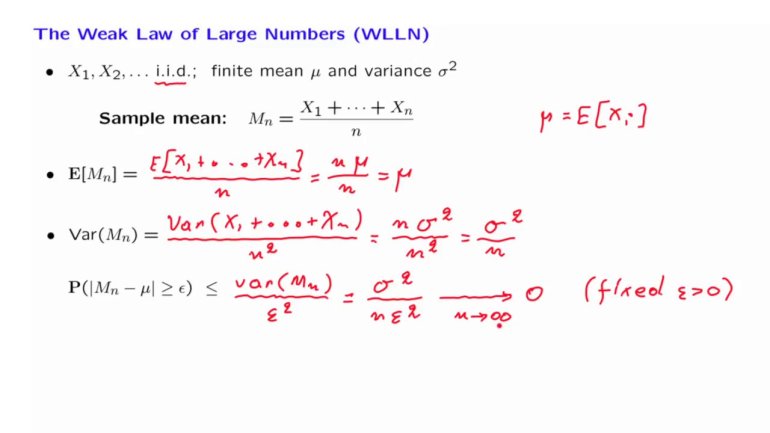
The law of large numbers is a fundamental principle in probability theory that has profound implications for gambling. While often misunderstood or misapplied by casual gamblers, this mathematical concept forms the backbone of how casinos operate and explains why they consistently profit in the long run.
At its core, the law of large numbers states that as a sample size grows, its mean will converge closer to the expected value. In the context of gambling, the actual results will tend to align with the mathematical probabilities over a sufficiently large number of bets or plays.
Understanding this law is crucial for gamblers. It explains why a lucky streak doesn't change the underlying odds, why casino games are designed the way they are, and why the house always has an edge in the long term. The law of large numbers demystifies the nature of chance in gambling, revealing the cold, hard mathematics behind the glitz and excitement of casinos.
What Is the Law of Large Numbers?
This article from Casinoz will delve into the intricacies of the law of large numbers as it applies to various forms of gambling.
Definition and Mathematical Concept
The law of large numbers is a principle in probability theory, which states that as the number of trials of a random process increases, the average of the results will converge to the expected value. More formally, it asserts that the sample mean approaches the theoretical mean or expected value as the sample size grows.
In mathematical terms, let X₁, X₂, ..., Xn be independent and identically distributed random variables with expected value μ. The law of large numbers states that the sample average (X₁ + X₂ + ... + Xn) / n converges to μ as n approaches infinity.
This law comes in two forms:
- Weak Law of Large Numbers: The probability that the sample average deviates from the expected value by any fixed amount approaches zero as the sample size increases.
- Strong Law of Large Numbers: The sample average converges almost surely to the expected value.

Historical Background and Development
The concept has roots dating back to the 16th century, but Jacob Bernoulli formally introduced it in his work "Ars Conjectandi" (The Art of Conjecturing), published posthumously in 1713. Bernoulli's theorem, as it was initially known, was a special case of the weak law of large numbers. Key developments in the history of the law include:
- 1713: Jacob Bernoulli proves the weak law for Bernoulli trials.
- 1837: Siméon Denis Poisson extends the law to variables with finite variance.
- 1867: Pafnuty Chebyshev provides proof using the inequality named after him.
- 1909: Émile Borel proves the strong law for coin tosses.
- 1933: Andrey Kolmogorov gives a general proof of the strong law.
The law of large numbers has since become a cornerstone of probability theory and statistics, with applications far beyond gambling, including physics, statistics, and financial theory.
How the Law of Large Numbers Applies to Gambling
Let’s discuss the principles of the law in gambling games.
Explanation of Expected Value
In gambling, the expected value (EV) is a crucial concept directly related to the law of large numbers. The EV of a bet is the average outcome if the bet were to be repeated many times. It's calculated by multiplying each possible outcome by its probability and then summing these products.
For example, in a simple coin flip bet where you win $1 on heads and lose $1 on tails:
EV = (0.5 × $1) + (0.5 × -$1) = $0
The law of large numbers tells us that as you make this bet repeatedly, your average winnings will converge to this expected value of $0.
Long-term vs. Short-term Outcomes
The law of large numbers is fundamentally about long-term behavior. In the short term, significant deviations from the expected value are not only possible but common. This is why gamblers can experience winning streaks or losing streaks.
However, these deviations tend to even out as the number of bets increases. The actual results will converge towards the mathematical expectation. This is why casinos, which deal with a large volume of bets, can reliably predict their profits over time.
For individual gamblers:
- Short-term: Results can vary widely from the expected value. A gambler might win big or lose significantly in a single session.
- Long-term: With continued play, results tend to align more closely with the expected value. If the game has a negative expected value (as most casino games do), sustained play will likely lead to losses.
For casinos:
- Short-term: Individual big wins or losses can affect daily results.
- Long-term: The vast number of bets placed ensures that results closely match the expected values, guaranteeing profit if the games are designed with a house edge.
This principle explains why casinos can offer large jackpots on games like slot machines. While an individual may win a life-changing sum, the casino knows that over millions of plays, these rare large payouts are more than offset by the many small losses of other players.
Examples in Various Gambling Games
The law of large numbers manifests differently across various gambling games. Let's examine how it applies to some popular casino games:
In European roulette, there are 37 numbers (0-36). When betting on a single number:
- Probability of winning: 1/37
- Payout: 35 to 1
- Expected value: (1/37 × 35) + (36/37 × -1) ≈ -0.027 or -2.7%
Over a few spins, outcomes can vary widely. However, the average loss will converge towards 2.7% of the total amount bet over thousands of spins.
| Name | Soft | Return to player | |||
|
|
98.6% | Play | |||
|
|
97.3% | Play | |||
|
|
97.3% | Play | |||
|
|
97.3% | Play | |||
|
|
97.3% | Play | |||
|
|
97.3% | Play | |||
|
|
97.3% | Play | |||
|
|
97.3% | ||||
|
|
97.3% | Play | |||
|
|
97% | Play |
Modern slot machines use random number generators to determine outcomes. While the exact probabilities are often not disclosed, the law of large numbers ensures that over many plays, the actual payouts will converge to the programmed return-to-player (RTP) percentage.
For example, if a machine has a 95% RTP:
- Short-term: A player might experience significant wins or losses.
- Long-term: For every $100 wagered, the average return will approach $95.
Blackjack is interesting because player decisions can affect the odds. With perfect basic strategy:
- House edge: About 0.5% (varies by specific rules)
Over many hands, a perfect strategy player will lose close to 0.5% of their total wagers. However, card counting can potentially shift the odds in the player's favor, though this requires playing a huge number of hands to realize the advantage.
| Name | Soft | Return to player | ||
|
|
99.78% | |||
|
|
99.69% | |||
|
|
99.65% | |||
|
|
99.6% | |||
|
|
99.59% | |||
|
|
99.59% | |||
|
|
99.54% | |||
|
|
99.54% | |||
|
|
99.54% | |||
|
|
99.33% |
In sports betting, the law of large numbers applies to both bookmakers and bettors:
- Bookmakers: Set odds to ensure a profit margin over many bets.
- Bettors: Even skilled bettors with a positive expected value need a large sample size of bets to overcome short-term variance.
For example, a bettor with a 54% win rate on even-money bets has a positive expected value but could easily have a losing month due to variance. The law of large numbers suggests their actual win rate will converge to 54% over many bets.
These examples illustrate how the law of large numbers underlies the mechanics of various gambling games. While short-term results can vary dramatically, the long-term trends invariably reflect the underlying probabilities and expected values.
Misconceptions and Gambler's Fallacy
Common Misunderstandings:
Many gamblers misinterpret or misapply the law of large numbers, leading to several common misconceptions:
- "Due" outcomes: Some believe that if an event hasn't occurred in a while, it's "due" to happen. For example, thinking that black is more likely to come up next after a long streak of red in roulette.
- Balancing in small samples: Expecting short-term results to "balance out" to match long-term probabilities. For instance, they may believe that a win must come soon after losing several bets in a row.
- Hot and cold streaks: Assuming past outcomes influence future probabilities in independent events. This might lead a gambler to keep playing a "hot" slot machine, believing it's more likely to pay out.
- Overlooking independence: Failing to recognize that in most gambling games, each event is independent of previous outcomes.
- Misunderstanding "long term": Believing that playing for several hours or days is sufficient for the law of large numbers to take effect when in reality, it often requires thousands or millions of trials.
How the Gambler's Fallacy Relates to the Law of Large Numbers:
The gambler's fallacy is a mistaken belief that if something happens more frequently than normal during a given period, it will happen less frequently in the future (or vice versa). This fallacy directly contradicts the true meaning of the law of large numbers.
Key points about the gambler's fallacy:
- It assumes a "balancing force" in random events, which doesn't exist.
- It fails to recognize the independence of events in most gambling scenarios.
- It often leads to increased betting after losses, based on the false belief that a win is "due."
While the law of large numbers states that long-term frequencies will converge to expected probabilities, it does not predict short-term fluctuations or patterns. The fallacy can work in reverse, too: assuming a streak will continue because it's "hot" when each event is independent.
Casino Advantage and House Edge
Casinos rely heavily on the law of large numbers to ensure profitability. Here's how they leverage this principle:
- The volume of play: Casinos encourage high-volume play, knowing that more bets bring results closer to the expected value.
- Multiple games: By offering numerous games simultaneously, casinos create a large sample size across their entire operation.
- Continuous operation: 24/7 operation increases the total number of bets placed, further aligning results with mathematical expectations.
- Bankroll management: Casinos maintain large cash reserves to weather short-term fluctuations and high-stakes wins.
- Game design: All games have a built-in house advantage, ensuring long-term profitability.
Explanation of House Edge in Different Games
The house edge is the average percentage of each bet the casino expects to keep over the long run. It's a direct application of the law of large numbers. Here are some examples:
American Roulette
- House edge: 5.26% on most bets.
- Reason: 38 numbers (including 0 and 00), but pays 35:1 on single-number bets.
- House edge: About 0.5% to 2% (varies based on rules and player skill).
- Reason: Player decisions affect the outcome, but the dealer acts last.
Slot Machines
- House edge: Typically 2% to 15%, but can vary widely.
- Reason: Programmed return-to-player (RTP) percentage.
- House edge: Varies by bet, from 1.41% on Pass/Don't Pass to over 16% on some proposition bets.
- Reason: Complex odds structure with multiple bet types.
Baccarat
- House edge: 1.06% on the banker bet, 1.24% on the player bet.
- Reason: The banker has a slight advantage, but the casino takes a commission on the banker's win.
The house edge ensures that the casino will profit from many bets. Individual players may win in the short term, but the law of large numbers guarantees that the casino's edge will manifest over time.
Implications for Gamblers
Risk Management Strategies
Understanding the law of large numbers can help gamblers develop more effective risk management strategies:
- Bankroll management: Set strict limits on how much you're willing to lose. This helps mitigate the impact of short-term variance.
- Session limits: Limit the duration of gambling sessions to reduce exposure to the house edge.
- Win goals: Set realistic win targets and be prepared to walk away when reached.
- Game selection: Choose games with lower house edges to extend play time and improve overall odds.
- Avoid chasing losses: Recognize that previous losses don't influence future outcomes.
- Embrace variance: Understand that short-term results can deviate significantly from expected values.
- Long-term perspective: View gambling as entertainment rather than a way to make money consistently.
Importance of Understanding Probability
A solid grasp of probability is crucial for responsible gambling:
- Realistic expectations: Understanding the true odds helps set realistic expectations about potential outcomes.
- Recognizing independent events: Most gambling games involve independent events, where past outcomes don't influence future results.
- Evaluating betting systems: Many betting systems fail because they don't change the underlying probabilities.
- Assessing "hot" and "cold" streaks: Recognize these as normal short-term fluctuations rather than predictive patterns.
- Calculating expected value: Estimating the expected value of bets can inform better decision-making.
- Understanding house edge: Knowing the house edge for different games and bets allows for more informed choices.
- Recognizing cognitive biases: Awareness of biases like the gambler's fallacy can help avoid common decision-making pitfalls.
- Long-term thinking: Understanding that the law of large numbers operates over many trials can prevent overconfidence based on short-term results.
Applying these risk management strategies and developing a strong understanding of probability can help gamblers make more informed decisions. This doesn't guarantee winning, but it can lead to more responsible gambling behavior and potentially extend play time within a given budget.
Statistical Variance and Its Impact
Short-term Deviations from Expected Outcomes
While the law of large numbers describes long-term behavior, short-term results can deviate significantly from expected outcomes. This deviation is known as variance or volatility.
Key points about short-term deviations:
- Magnitude: Short-term results can vary widely from the expected value, sometimes resulting in significant wins or losses.
- Unpredictability: These deviations are unpredictable in direction and size.
- Duration: "Short-term" can last longer than many gamblers realize, potentially spanning hundreds or even thousands of trials.
- Impact on perception: These deviations can lead to misconceptions about game "fairness" or personal "luck."
Volatility in Gambling Results
Volatility refers to the degree of variation in results over time. Understanding volatility is crucial for both casinos and gamblers.
High vs. Low Volatility Games:
- High volatility (e.g., slot machines with large jackpots): More extreme swings in short-term results, with the potential for big wins and longer losing streaks.
- Low volatility (e.g., blackjack): More consistent results over shorter periods, but typically smaller maximum wins.
Bankroll Implications:
- Higher volatility games require larger bankrolls to withstand potential downswings.
- Lower volatility games allow for longer play times with a given bankroll.
Risk-Reward Tradeoff:
- Higher volatility often correlates with the potential for larger payouts.
- Lower volatility usually means more frequent but smaller wins.
Psychological Impact:
- High volatility can be more exciting but also more stressful for some players.
- Low volatility can provide a more stable, predictable gambling experience.
Session Duration:
- In high-volatility games, short sessions are more likely to result in significant wins or losses.
- Low-volatility games typically require longer sessions to see significant deviations from the expected value.
Variance and Game Choice:
Players should choose games with volatility levels that match their risk tolerance and goals. Casinos offer a range of volatility options to cater to different player preferences.
Comprehending statistical variance helps explain why gambling results can differ drastically from expectations in the short term, even in fair games.
The Role of Technology in Modern Gambling
Random Number Generators
Random Number Generators (RNGs) are crucial in modern gambling, especially in digital and online environments. They ensure the randomness required for fair play and the application of the law of large numbers.
Key points about RNGs:
Function: RNGs produce sequences of numbers that are statistically random.
Types:
- Pseudo-Random Number Generators (PRNGs): Algorithm-based, deterministic but appear random.
- True Random Number Generators (TRNGs): Based on physical processes, truly unpredictable.
Application: Used in slot machines, online casinos, and electronic versions of table games.
Testing and Certification: Regularly audited by third-party agencies to ensure fairness and randomness.
Impact on Game Outcomes: Ensure each play is independent and unbiased, aligning with probability theory.
Online Gambling and the Law of Large Numbers
The rise of online gambling has significant implications for applying the law of large numbers.
- Increased Volume: Online platforms can handle many more games simultaneously than physical casinos, accelerating the convergence to expected values.
- Data Collection: Online casinos can easily track and analyze vast play data, allowing for more precise alignment with theoretical probabilities.
- Game Variety: Online platforms offer various games, each with its probabilities and volatility levels.
- Speed of Play: Faster game rounds online mean more trials in less time, potentially reaching "long-term" results faster.
- Accessibility: 24/7 availability and ease of access can lead to more frequent play, potentially exposing players to greater long-term effects of the house edge.
- Virtual Table Limits: Online casinos can offer lower minimum bets, allowing players to extend their play time and experience more trials with a given bankroll.
- Transparency: Many online platforms publish theoretical return-to-player percentages, making the long-term expected outcomes more transparent.
- Regulation Challenges: Online gambling is global, which presents challenges in ensuring fair play and adherence to randomness standards across jurisdictions.
- Player Behavior Tracking: Online platforms can monitor player behavior more closely, potentially identifying problem gambling patterns earlier.
- Automated Systems: Many online casinos use AI and machine learning to optimize their operations based on the law of large numbers and player behavior.
Technology integration in gambling has, in many ways, made the application of the law of large numbers more precise and transparent.
Responsible Gambling and the Law of Large Numbers
Understanding the law of large numbers can contribute significantly to responsible gambling practices:
- Realistic Expectations: Recognizing that long-term outcomes will align with mathematical probabilities helps set realistic expectations about winning and losing.
- Budget Setting: Knowing the house edge and expected value of games allows for more accurate estimation of potential losses over time.
- Game Selection: Choosing games with lower house edges or higher return-to-player percentages can extend play time and reduce long-term losses.
- Recognizing Randomness: Understanding that each event is typically independent helps avoid fallacious thinking about "due" outcomes or hot streaks.
- Emotional Control: Knowing that short-term results can vary widely from expected values can help maintain emotional equilibrium during winning or losing streaks.
- Avoiding Chasing Losses: Understanding that past losses don't influence future outcomes can prevent the dangerous behavior of trying to "win back" losses.
While the law of large numbers is a powerful concept, it's crucial to understand its limitations in the context of individual gambling experiences:
- Sample Size: A single gambling session, or even multiple sessions, may not constitute a large enough sample for the law to be applicable.
- Time Frame: The "long run" in the law of large numbers often requires far more trials than a typical gambler will ever experience.
- Variability: Short-term results can deviate significantly from expected values, leading to experiences that seem to contradict the law.
- Individual Impact: While casinos rely on the law of large numbers across all their players, individual gamblers may never play long enough to see a true convergence to expected values.
- Psychological Factors: Cognitive biases and emotional responses can lead to decisions that don't align with statistical understanding.
- Skill-Based Elements: In games with elements of skill, individual performance can impact results, potentially deviating from purely chance-based expectations.
- Changing Conditions: Unlike controlled statistical experiments, real-world gambling conditions (game rules, bet sizes, etc.) may change over time.
Responsible gambling involves recognizing the power and limitations of statistical principles, such as the law of large numbers. It means using this knowledge to make informed decisions, set realistic expectations, and maintain a healthy perspective on gambling as entertainment rather than a reliable way to make money.
Conclusion
The law of large numbers is a fundamental principle that underpins the entire gambling industry. It reveals the mathematical reality behind gambling's glitz and excitement. While it ensures casinos' long-term profitability, it also provides valuable insights for individual gamblers.
For the casual gambler, this knowledge can enhance the entertainment value of gambling by setting realistic expectations and avoiding common misconceptions. For those prone to problem gambling, it might serve as a sobering reminder of the mathematical certainty of the house edge over time.
Remember, the house may have the mathematical edge in the grand casino of chance, but knowledge is the player's best bet.
Here are several reliable online casinos.
Recommended Reading on The Law of Large Numbers in Gambling
- "The Mathematics of Gambling" by Edward O. Thorp
- "Fortune's Formula: The Untold Story of the Scientific Betting System That Beat the Casinos and Wall Street" by William Poundstone
- "Against the Gods: The Remarkable Story of Risk" by Peter L. Bernstein
- "The Theory of Gambling and Statistical Logic" by Richard A. Epstein
- "Probability Guide to Gambling: The Mathematics of Dice, Slots, Roulette, Baccarat, Blackjack, Poker, Lottery and Sport Bets" by Catalin Barboianu


















































